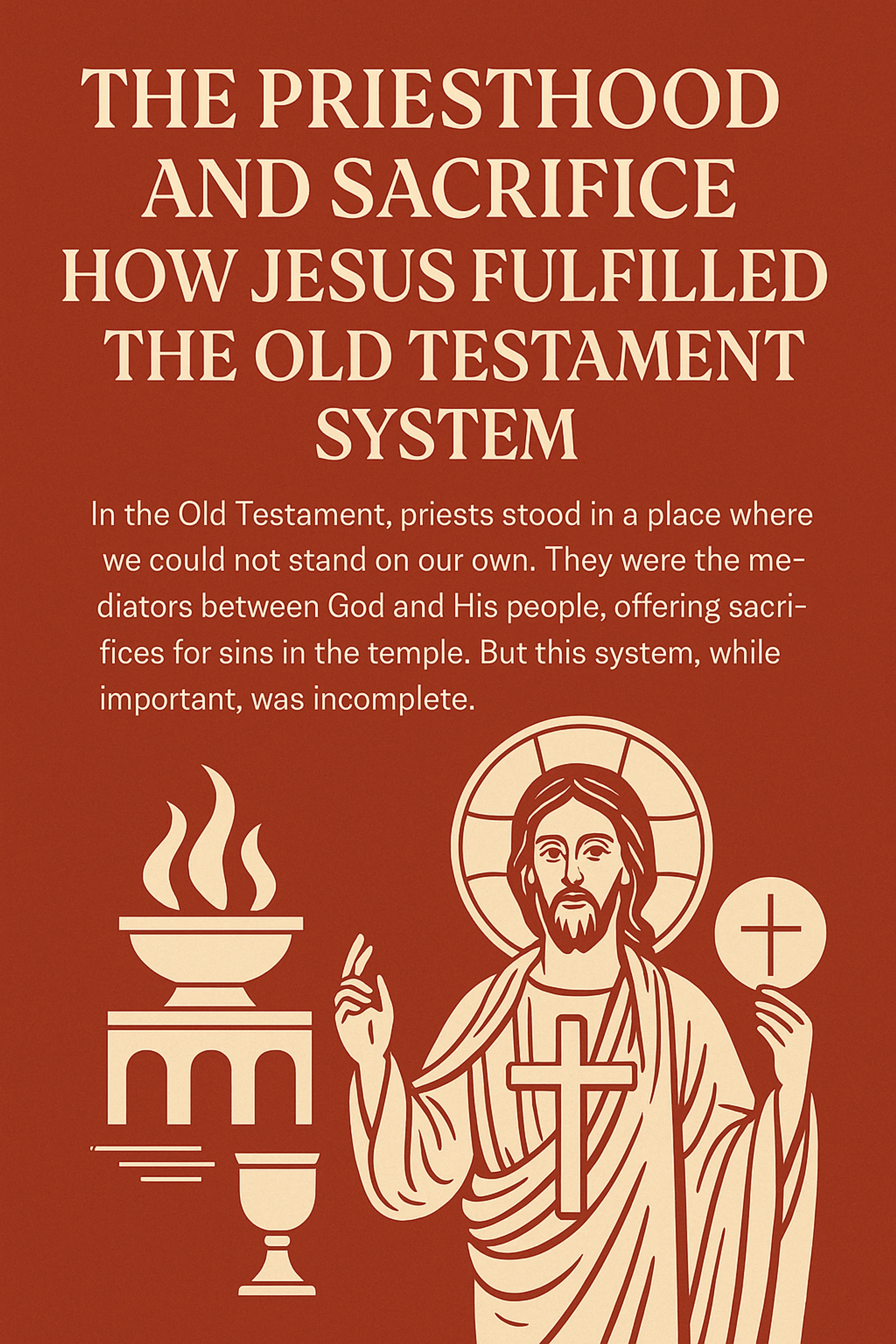The Priesthood and Sacrifice: How Jesus Fulfilled the Old Testament System

In the Old Testament, priests stood in a place where we could not stand on our own. They were the mediators between God and His people, offering sacrifices for sins in the temple. But this system, while important, was incomplete. Today, we'll explore how the priesthood pointed to our need for forgiveness, what it teaches us about the seriousness of sin, and how Christ fulfills and surpasses that old system in the new covenant.
What Was the Purpose of the Old Testament Priesthood?
In the Old Testament, priests were called, clothed, and set apart to bear the names of the people of God in His presence and to bless in God's name. Their work taught Israel something essential: access to God is both precious and costly.
The sacrificial system in Leviticus made this lesson visible through the language of sin, blood, and substitution. A spotless animal from your own herd would be offered, showing that sin leads to death. The only path back to life was through a God-given substitute.
This wasn't busy work—it was mercy that God provided. It was a way for God to stay in covenant with a sinful people, despite how often they stumbled and complained in the wilderness.
Why Couldn't the Old System Bring Perfection?
Hebrews 7:11 asks a profound question: "If perfection could have been attained through the Levitical priesthood... why was there still a need for another priest to come?"
The answer is clear: the old priesthood did important work, but it could not be finished. Why?
Priests died Sacrifices had to be repeated The tabernacle was only a copy and shadow, not the true sanctuary The entire structure pointed forward to something greater. Hebrews makes a stunning claim: God promised a new priesthood after Melchizedek, not Aaron, which meant a change in the law itself.
How Does Jesus Fulfill the Role of High Priest?
Jesus is not simply the best in a long line of priests. He is the Great High Priest who:
Is both priest and sacrifice Bore our names upon His heart Offered not the blood of animals, but His own blood Entered not a man-made tent, but the true holy place in heaven Did so once for all, securing our eternal redemption Lives forever to intercede for us Hebrews 8:1 tells us: "We have such a high priest, who is seated at the right hand of the throne of the Majesty in heaven." This is what we confess in the Creed every Sunday—that Jesus sits at the right hand of God the Father.
What Does Jesus' Sacrifice Mean for Our Sins?
The implications of Jesus' sacrifice are profound. It means that not a single dot of ink is left on your record to resolve. Jesus has completely wiped out your sins.
Unlike us, who tend to remember when people sin against us, Jesus forgives and forgets our sins. We don't have to live in perpetual depression over every sin we've ever committed. We don't have to wonder if we'll make it to heaven.
This is a cleansing of your conscience. You don't have to hold onto guilt. When you truly go to the Lord in repentance, you can have a clear conscience that God has forgiven you on the cross once and for all. The sacrifice is finished.
What Does It Mean That We Are a Royal Priesthood?
If Jesus is the Great High Priest, what does that make us? Scripture says we are "a royal priesthood, a holy nation." The Church of God is the chosen people of God.
As this royal priesthood, we:
- Offer spiritual sacrifices of praise and thanksgiving
- Proclaim the Word of God
- Speak blessings
- Intercede for others in their darkest days
- Minister in the name and power of Jesus Christ
- Share the gospel
- Baptize new believers
We have the power of Jesus Christ and the Holy Spirit working through us.
How Should We Respond to This Great Sacrifice?
Understanding the seriousness of sin and the completeness of Christ's sacrifice should lead us to:
1. Refuse to make peace with sin
2. Confess quickly rather than letting sin brew within us
3. Forgive freely
4. Seek reconciliation regularly
5. Worship with reverence and joy because the living Christ is among us when we pass the peace in church saying, "Peace be with you," it is a true peace that only comes from God because our sins are wiped clear.
Life Application
This week, I challenge you to live in the freedom that comes from knowing your sins are completely forgiven through Christ's sacrifice. Instead of carrying guilt and shame, bring your sins to the throne of God, the Great High Priest, and leave them there.
Ask yourself:
- What sins am I still carrying guilt for, even though Christ has already forgiven them?
- Who do I need to forgive, knowing that Jesus commands us to forgive as we have been forgiven?
- How can I live as part of the "royal priesthood" this week, representing Christ to others?
- In what ways can I grow as a disciple, continuing to learn and develop in my faith?
Remember, Jesus has become the all-sufficient sacrifice. He has atoned for our sins so that we can go in peace with joy and thanksgiving for what He has done. Let's share that forgiveness and mercy with others who don't yet have the assurance of their pardon.
